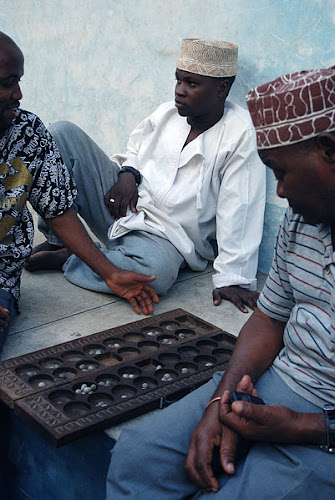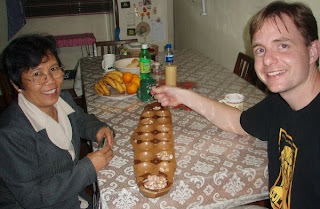
Picture from Zanzibar
Tamil version of this article has been already posted here: swami
Pallankuzhi (Mancala) Mystery
Did the board game Mancala/Pallankuzi/Alagulimane originate in South India? It looks like it.
Pallankuzhi is played on a rectangular board with 2 rows and 7 columns on either side. There are a total of 14 cups (kuzhi in Tamil language). Seeds, shells, small stones are all commonly used as counters in the board game. As the game proceeds, each player distributes the shells over all the pits. The players may capture the shells, as permitted by the rules of the game. The rules of capture depend on the variant of the game played. The game ends when one of the players captures all the shells, and is declared as a winner.
12 counters are placed in each cup except the middle of each row into which only 2 counters are placed. The starting player lifts the counters from any of his holes and, going counter-clockwise, distributes one counter in each hole. If he reaches the end of his cups he goes on his opponent's side of the board. When the player drops his last counter, he takes the counter. This is what we get from the encyclopaedias. But this game is in many parts of Africa and Indonesian islands. What is the origin? Who invented it? It is a mystery.
My research shows that this game originated in India. There are valid reasons to believe so 1.The game is played all over India 2. Wherever Indians went for trade /commerce this game spread to that parts of the world. 3. The words used in the game are of Tamil or Sanskrit origin.4.We have a reference to this game in the ancient Pallava copper plates which is in two parts: Tamil and Sanskrit. Read the details below:
Pallaang Kuzi is the Tamil name and Mancala is the Hindi name for the game.
Copper Plate Inscription
Pallava king Simhavarman’s Pallankovil Copper Plates, while mentioning a land donation to a Jain teacher Vajranandhi, gives the four borders of the donated land. One of the borders land mark is PALLANKUZI Ka meaning garden with Pallankuzi or a garden that looks like Pallankuzi with many pits. Whatever the meaning may be we have the word on a copper plate dated to 550 AD.
The Egyptians had played this game 3000 years ago. We have pits on the ground near Pyramids and in Ethiopia. I have already written in my post ‘DID INDIANS BUILD PYRAMIDS?’, that Indian workers were involved in the building of the pyramids. And from them the Africans might have learnt it. Our Trade links were strong with the Indonesian islands according to Kalidas and others. Kalidas refers to “Islands beyond Indian mainland” where from the spices came.
India is a vast country. If the game is played in nook corner of India for thousands of years it must have originated here like Chess and Snakes and Ladders (Paramapatha Sopana Patam in South India). The words used in Mancala and Pallankuzi are native words. We used seeds (Vithai or Kottai in Tamil or shells).
Indonesians called this Congkak and Philippines called this Sungka which is the corrupted from of Sankya (Numbers in Sanskrit) Indonesians’ link with India and Madagascar was already explained in my posts: “India –Madagascar Link via Indonesia” and “Ancient Sanskrit Inscriptions in strange places” In my blogs. South East Asian Countries were ruled by Hindus for 1300 years from second century AD.

Picture from Philippines
Only the coastal areas in Africa knew this game which again showed that it was brought to them by ancient mariners. But slowly it got local words for the game and changes in the rules.
African/Caribean words such as Oware, Nanoware, Awale( Awari) have the Tamil word (Vidhai=Virai=Ware=seeds/nuts).
Indians were leading in Mathematics in the ancient world. Even the Greeks like Pythagoras learnt it from us. The world has accepted that Chess originated in India and slowly spread to the Western world. Many scholars believed that what we call Pythagoras theorem today, the value of Pi etc went from India. Pallankuzi/ Mancala is no exception. Needless to say it would not have originated in Ancient Africa or Indonesia where mathematical genius was lacking or at least not as good as India.
This game sharpens counting skills and improves mental calculation. Making a quick estimate of the seeds and judging the number of pockets (pits) to be filled requires one to be very attentive. Kannadigas call this game Alugulimane. The Hindi word for this game is Mancala. They attribute Arabic origin (nagala= moved) for this word. It did not make any sense in the meaning or the letters. Wikipedia says this word is used in Egypt, Syria and Lebanon, but it did not mean the same game.
Hindi Name Mancala
Mancala might have come from Mangala (auspicious). Tamils used the words Kasi, Pasu when they capture the counter. Sanskrit words like Sita Pandi, Raja Pandi, Kasi Pandi shows its Indian origin. More over Sita Pandi is the board game Sita played in Asoka vana in Sri Lanka. Native words like 3 Virai (Vidhai) and 6 Virai Attam were used. No mixture of foreign words. Wikipedia adds more than 800 Mancala games are known. This is one of the ancient games of Sri Lanka s well.
There is a long list of names for this game in different parts of the world. So the Arabic origin can’t be right. If anyone sticks to the Arabic origin for the word Mancala, then they have to explain how come it is played in South India with pure Tamil words. They must also explain why it has got different names in other parts of the world. In short Arabic origin is not correct. Arabic learnt all sciences from India which is a well known fact. Hindu numerals are called Arabic numerals because they took it to the western world. I have shown elsewhere in my blogs all the Arabian Night stories are from India adapted for the Arabs. Mancala may be a distortion of the Tamil words Man +Kuzi= sand pits. It is played by the villagers on the floor.
